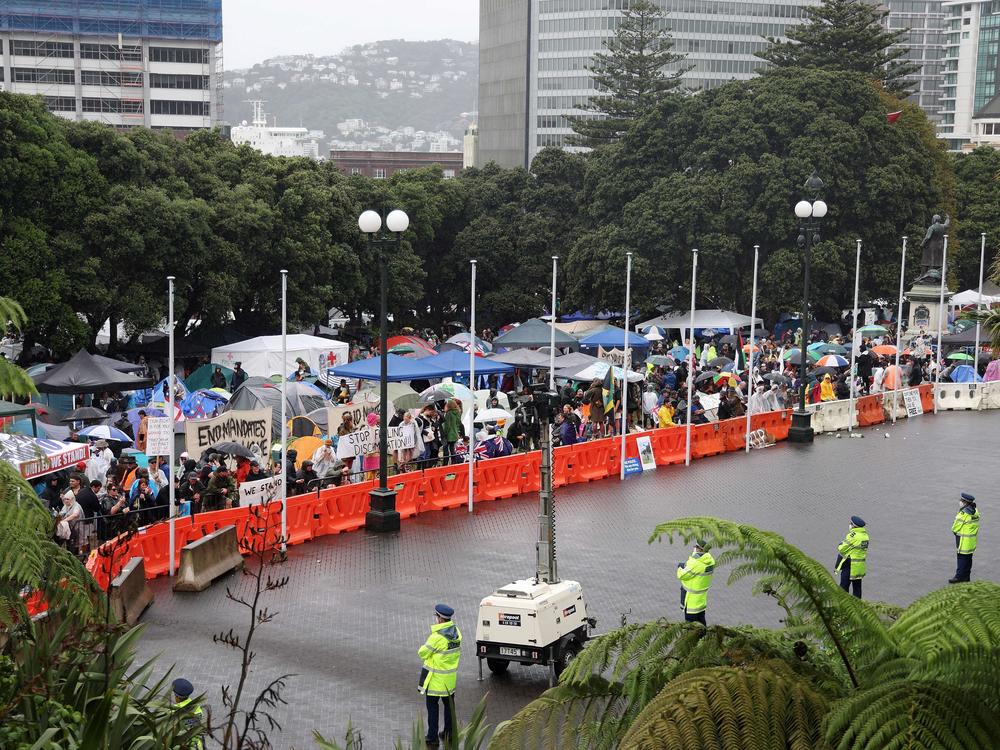Section Branding
Header Content
New Zealand hopes Barry Manilow, James Blunt and the Macarena can disperse protesters
Primary Content
Authorities in Wellington, New Zealand, are getting creative in their efforts to disperse the crowd of anti-government protesters who have refused to budge for nearly a week.
After trying direct appeals and deploying sprinklers, they're turning to the hit songs of Barry Manilow, James Blunt and others.
Hundreds of people protesting the government's mask and vaccine mandates arrived in the capital city last week. They set up camp outside Parliament as lawmakers returned from summer recess, and have proceeded to block traffic and gather in the streets ever since.
Superintendent Corrie Parnell, the Wellington District Commander, said on Monday that the disruption to residents, schools and workplaces is "creating real stress and concern."
"We continue to appeal to protesters to leave the demonstration and to take their children – it has been wet and cold overnight, and we now have concerns about the health risks posed and sanitation issues," Parnell added.
There were some 3,000 protesters over the weekend, with a constant presence of 400 to 500 people in tents at the encampment and in surrounding streets, Radio New Zealand reported.
Police said on Monday that some protesters had moved their vehicles overnight, and are directing them to relocate to a newly-designated parking facility at Sky Stadium.
The plea follows a series of attempts — both direct and indirect — to get the protesters to leave.
Officers tried to forcibly clear the grounds on Thursday, arresting more than 120 protesters but failing to significantly disperse the crowd.
"Police have identified a range of different causes and motivations among the protestors, making it difficult to open clear and meaningful lines of communication," Parnell said the next day.
Trevor Mallard, the speaker of the New Zealand House of Representatives, had Parliament's sprinklers activated on Friday, the fourth day of protests.
According to RNZ, some protesters responded by digging trenches to try to redirect the water to nearby drains. The tents and their occupants stayed put, even as a heavy downpour turned the ground to mud.
On the fifth day, Mallard initiated what RNZ described as "a battle of the music speakers" when he started playing a 15-minute loop of Barry Manilow music (including "Mandy"), "Macarena" by Los del Río and COVID-19 vaccine advertisements through the speakers inside Parliament buildings. News outlet Stuff reports the tunes were picked from a playlist of the world's 25 most hated songs.
The music was met with boos and the 1984 Twisted Sister song "We're Not Gonna Take It," which CNN notes has already become a kind of anthem of the Canadian truckers that launched the movement with similar protests late last month.
Mallard's playlist has evolved in recent days, with RNZ reporting it now includes an out-of-tune recorder rendition of Celine Dion's "My Heart Will Go On." It also features catchy children's songs, like Frozen's "Let It Go" and "Baby Shark," CNN adds.
English musician James Blunt offered up his own catalog in a tweet, sharing a BBC story about the Manilow music and addressing New Zealand Police: "Give me a shout if this doesn't work." Mallard took him up on the offer.
RNZ reports that Blunt's "You're Beautiful" has been played so many times that protesters now know most of the words and are singing along.
The tactic has made headlines around the world, and elicited mixed reactions.
Mallard told Stuff over the weekend that surrounding residents had been consulted on the plan and were supportive. He said their lives had been disrupted by the protests already, and some had even gone to stay with friends.
"And one of them is a Barry Manilow fan," he added.
Some opposition lawmakers and police authorities have criticized the move, characterizing it as childish and saying it would only spur protesters to stay put.
Parnell told RNZ that "it certainly wouldn't be tactics or methodologies that we would endorse, and it's something we would have preferred did not occur."
"But it did occur, so we have to deal with what we've got in front of us."
This story originally appeared on the Morning Edition live blog.
Copyright 2022 NPR. To see more, visit https://www.npr.org.

